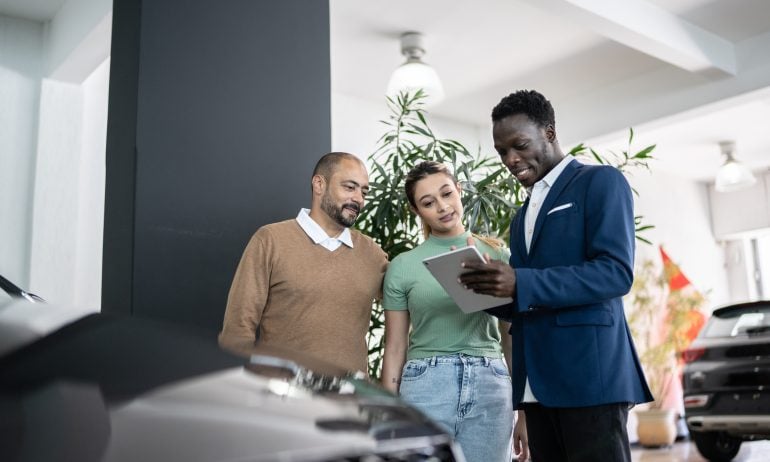Is Car Leasing Dead?

Many, or all, of the products featured on this page are from our advertising partners who compensate us when you take certain actions on our website or click to take an action on their website. However, this does not influence our evaluations. Our opinions are our own. Here is a list of our partners and here's how we make money.
Leasing a car was once a popular and flexible way to finance a new vehicle. But increases in car prices, low inventories and rising interest rates have forced the practice into a nosedive.
“Lease offers are horrible, and consumers are not opting to lease as a result,” says Jonathan Smoke, chief economist for Cox Automotive.
As many as 30% of new cars were leased in 2019; that's fallen to 19% as of September, according to Cox data. The pandemic slowed leasing, but it was really the inventory shortages, starting in May 2021, that sent it tumbling, Smoke says.
Average monthly lease payments in August reached $581, rising $120 from two years earlier, according to Ivan Drury, director of insights for car research site Edmunds. Compare that with the average 70-month car loan payment, which reached $707 per month, up $150 from two years ago.
But leasing isn’t really dead. Some of the benefits consumers have liked about leasing remain. And experts speculate that good offers could return as soon as year’s end.
Where have all the 'lease specials' gone?
In the past, manufacturers wanting to move the metal frequently offered “lease specials” — attractive monthly payments made possible by manipulating the lease formula. Their captive lenders — banks set up by car companies that finance most leases — lowered interest rates or raised the projected value of the car, known as the “residual value.”
“Serial leasers,” those who traditionally lease rather than buy, remember what their monthly payments have been, Smoke says. When they see the current high lease payments, they're often opting to purchase the vehicle they're leasing.
Some lease interest rates are now “over the moon,” says Oren Weintraub, president of car-buying concierge service Authority Auto in Tarzana, California. Recently, he saw one manufacturer charging 8% interest, known as the “money factor,” for a lease payment. But he tells his clients that leasing is still worth considering.
Auto loans from our partners

on Auto Credit Express
Auto Credit Express

N/A
525
on Auto Credit Express

on Consumers Credit Union
6.24 - 17.54%
600
on Consumers Credit Union
Why some car shoppers still lease
The factors that drew people to leasing in the past are still beneficial, says Scot Hall, executive vice president of operations at Swapalease.com. For example, he says, leasing provides:
Lower down payment and lower monthly payments. Lease payments have risen but are still lower than financing a car. For the country’s most popular vehicle, the Ford F-150, the average loan payment was $832 in the second quarter of 2022, according to Experian Automotive. The average lease payment for the same vehicle was $516.
Locked-in future price. Your purchase price, if you decide to buy the vehicle at the end of the lease, is set in your lease contract as the residual value. If the car increases in value — what’s happening now — you can buy the car at a bargain price. Or you can turn the car in and walk away.
Shorter commitment. Leasing is an easy way to get in and out of cars so you can frequently be driving the latest and greatest models.
Less sales tax. In a lease, you typically pay sales tax only on the total of the lease payments, not the purchase price of the vehicle.
Protection from loss. If your car is damaged in an accident and then repaired, it will be worth less when it’s sold. If you're leasing, this isn’t your problem — the leasing company will take the hit.
Warranty and lower maintenance. New cars come with a minimum 36-month bumper-to-bumper warranty — no need to purchase extended coverage. And some leases come with free maintenance.
The latest tech, without the risk. Weintraub and Hall cite the rapid evolution of technology and safety features and electric vehicle batteries as reasons to lease.
“The technology is moving so fast, I practically force my clients to lease if they’re going to get an EV,” Weintraub says.
Conversely, Hall says that some consumers are “wary of new technology, and leasing provides a relatively cautious way of adoption.” For example, the vast majority of EVs were leased until recently, as consumer fears about the battery life meant they didn't necessarily want to own one long term.
Options for Lease Buyout Loans
Min. credit score500 | Min. credit score600 | Min. credit score500 |
Est. APR5.29-21.99% | Est. APR5.01-29.90% | Est. APR4.99-14.99% |
Loan amount$5,000-$150,000 | Loan amount$5,000-$8,000 | Loan amount$3,000-$250,000 |
If you’re considering a lease
To see which form of financing makes sense, it’s a good idea to do a simple cost comparison of leasing-to-buy versus buying outright, Weintraub says. Here’s how to see which fits best:
Total cost of a lease: Add the cost of the down payment (sometimes called a “drive-off fee”) to the total cost of all the monthly lease payments. Then, add to that the cost of buying the car later at the residual value.
Total cost of buying: This is the down payment plus the total of all the monthly payments. If you pay off the loan early, you will reduce the amount spent on interest.
In many cases, there might be a small financial difference between leasing and buying the car later and buying the car outright. If that happens, Weintraub recommends leasing because, when the car market stabilizes, you might be able to buy the same car at a cheaper price.
Recent leasing changes to look out for
Beware of restrictions. Many automakers no longer allow a third party — usually a car dealer taking a trade-in — to buy the vehicle at lease end. Tesla goes further, with no buyout option at the end of the contract.
Your mileage may vary. Some leases now include 10,000 miles a year rather than the traditional 12,000 miles. While this lowers the payment, you might get stuck with a mileage penalty when you turn in the vehicle.
Be buyout smart. If your lease is ending soon, the residual value is probably a bargain. Consider buying out your lease for yourself or a family member so you don’t lose your equity.





